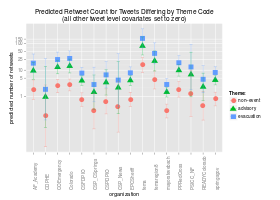
Datalab Faculty
Emma SpiroCollaborators
Jeannette Sutton
Carter Butts
Project Description
Serial transmission - the passing on of information from one source to another - is a phenomenon of central interest in the study of informal communication in emergency settings. Microblogging services such as Twitter make it possible to study serial transmission on a large scale, and to examine the factors that make retransmission of messages more or less likely. Here, we consider factors predicting serial transmission at the interface of formal and informal communication during disaster; specifically, we examine the retransmission by individuals of messages (tweets) issued by formal organizations on Twitter. Our central question is the following: How do message content, message style, and public attention to tweets relate to the behavioral activity of retransmitting (i.e., retweeting) a message in disaster?
Publications
Sutton, J., C.B. Gibson, N.E. Phillips, Emma S. Spiro, C. League, B. Johnson, S.M. Fitzhugh, and C.T. Butts. (2015) ``A cross-hazard analysis of terse message retransmission on Twitter.'' Proceedings of the National Academy of Sciences, 112(48) 14793-14798; doi:10.1073/pnas.1508916112.
Sutton, J., C.B. Gibson, Emma S. Spiro, C. League, S. Fitzhugh, and C.T. Butts. (2015) “What it Takes to Get Passed On: Message Content, Style, and Structure as Predictors of Retransmission in the Boston Marathon Bombing Response.” PLoS ONE. 10(8): e0134452.
Sutton, J., Emma S. Spiro, B. Johnson, S. Fitzhugh, B. Gibson and C. T. Butts. (2014) “Online Message Amplification in the Boston Bombing Response” Proceedings of the International Conference on Information Systems for Crisis Response and Management (ISCRAM). University Park,
Pennsylvania.
Sutton, J., Emma S. Spiro, M. Greczek, B. Johnson, S. Fitzhugh, and C. T. Butts. (2013) “Tweeting the Spill.” International Journal of Information Systems for Crisis Response and Management. 5(1), 1-21, pp. 58-76.
